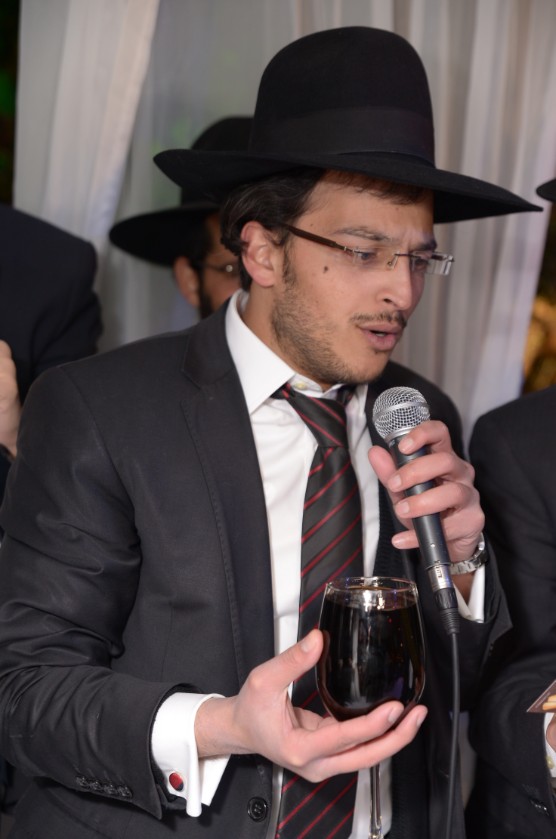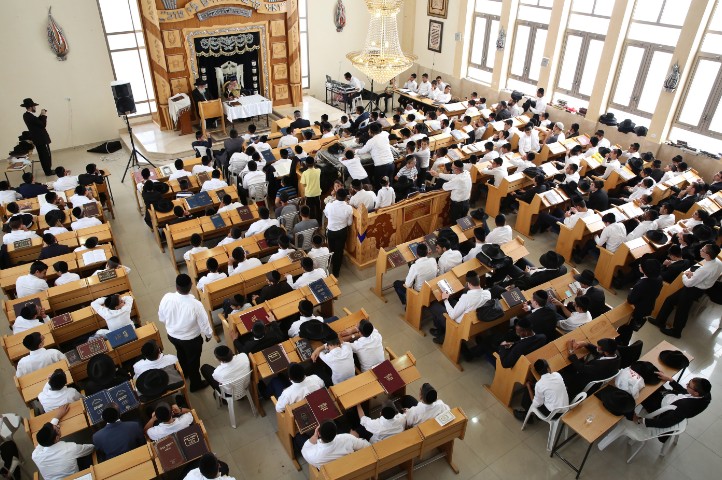Rabbi Uziel Lurie: "We've Been Through Three Study Halls, Each with One Common Denominator: Unique and Unconventional Learning"
The kollels managed by Rabbi Uziel Lurie are the most creative you've ever heard of. They originally operated inside a transportation station, then moved to a food network, and today are located at the Yeshivat Kaf Hachaim, funded directly by donors depositing money into the scholars' bank accounts. For the opening of 'Elul Zman', we took a look at this unique kollel.

Bain Hazmanim is concluding, and along with the many scholars returning to the kollel, there is also a group of 14 scholars who are returning to study at the kollel located in the Yeshivat Kaf Hachaim, situated in the center of Jerusalem. Yes, the kollel is currently housed in a yeshiva, but it is unclear where it will be next, as the kollel, under the leadership of Rabbi Uziel Lurie, is unique in that in the last six years, it has moved through no fewer than three study halls, spreading a special light in each.
"Because that is our goal," explains Rabbi Lurie, "It is important for us that the scholars learn in a kollel framework, but beyond that, it is important that they spread the Torah to others around them, bringing more and more Jews closer to Torah learning." This is indeed the reason why, over the past years, the unique kollel settled inside the offices of a transportation company, then moved to the 'Super Fresh' food network, where Torah was studied next to the food shelves, and now resides in the Yeshivat Kaf Hachaim, a yeshiva for those returning to religious observance, where it effectively spreads great light among the students.
First Station: Transportation Company
"I founded the kollel about six years ago," Rabbi Lurie tells us, "I was then a young scholar, 27 years old, but nonetheless, I took on the significant decision to establish a kollel. I was looking for a more unique kollel than those I knew. I wanted to establish a kollel that combines both Talmud and Jewish law, unlike other kollels that concentrate only on certain chapters from a tractate, I wanted to study the tractates in their entirety, not leaving until we finished them. Thus, I founded the kollel."
And how does a young man succeed in funding scholarships for scholars?
"That indeed required a lot of investment. Initially, I received help from my uncles and close associates, and also support from the yeshiva where I studied in my youth—Yeshivat Brit Yaakov, in Beit Vagan. At this stage, there were only six scholars in the kollel, and so we started small. I believe the scholars came to study with me because they connected with the young head of the yeshiva and the learning method I offered, and over time they just stayed."
For a year and a half, the kollel operated within the yeshiva itself, and then Rabbi Lurie received a proposal from "Tzir-Tiyur" - a transportation company that decided to establish a morning kollel in its office building located in the Ora settlement near Jerusalem. "In 'Tzir-Tiyur', they proposed to host the scholars in the morning hours, while I was required to secure them scholarships for the afternoon," he recounts. "Thanks to this, we were able to expand the kollel framework to 12 scholars and also moved to the Tzir-Tiyur's building in the Ora settlement."
 Rabbi Uziel Lurie
Rabbi Uziel LurieBut what drives a transportation company to decide it wants to fund a kollel of scholars? After all, that involves a lot of money!
"It's truly a very unique and moving story because until the kollel was established, the transportation company operated as usual, under secular ownership of two brother partners. Just before we moved there, one of the brothers invited a religious Jew to teach him a short lesson every morning. Subsequently, his brother, who works with him as a partner, joined the lesson. Occasionally, they needed study books, but soon found out that not only were there none in the company's building, but in the entire area, suitable holy books couldn't be found. The scholar lamented this and made them a surprising offer—to establish a kollel inside the office building. The two's response was as surprising as the offer—'We are willing, what do we need to do for this?'"
Thus, in this way, Rabbi Lurie was offered to bring his kollel to the location, and from that day on, the sound of learning echoed in the company offices in the Ora settlement. Initially, the scholars sat and studied around the table in the office, as there was no room available for them. At some point, the business owners realized the necessity of a study hall, but since they couldn't provide the necessary equipment, the drivers and dispatchers of the company volunteered to donate from their funds to furnish and bring in stands and benches.
"The most touching aspect is that all the progress and development of the study hall were purely thanks to the donations of the drivers," Rabbi Lurie recounts with great appreciation. "After a year, the kollel moved to a new building. Initially, the structure was completely neglected and unconstructed, and we sat on the floor and studied. But over time, the drivers and dispatchers donated more and more of their funds and renovated the new study hall. There was nothing we asked for that we didn't receive. They went out of their way for us."
Conversely, he notes that the company's drivers got closer to Judaism and often joined the kollel's prayers. "Whenever the drivers or dispatchers had a few free minutes, they tried to 'jump' into the study hall, and we sat and learned with them. For this purpose, we dedicated a special shelf with books by Rabbi Zamir Cohen and other suitable books to bring hearts closer."
The drivers also showed great interest in the prayers. "Almost everyone participated in the afternoon prayer," he recounts, "I won't forget how a driver came here whom we offered to pray, but he refused. However, after we urged him repeatedly, he accepted the offer and opened the prayer book. For a long hour, he prayed the Amidah prayer, and we waited patiently (later it turned out he had said both 'Mashiv Haruach' and 'Morid Hatal', as well as 'Yaaleh Veyavo' and 'Tachanun', praying the entire afternoon service). After that, he asked to say Kaddish, and tears came down. 'Thanks to you, I prayed after twenty years without opening a prayer book,' he told us."
Ultimately, as Rabbi Lurie says, they left the place because of the long distance, but the kollel itself still exists. "We didn't leave before ensuring that other scholars came to replace us."
Second Station: Super Fresh
About two years ago, Rabbi Lurie's kollel moved to its new location—inside the 'Super Fresh' food network located near the central bus station in Jerusalem. The food network made a similar decision to Tzir Tiyur. "The owners of the network decided to bring the scholars' kollel into their network because they felt it would bring them blessing to their business; they felt it was the talisman of the business," explains Rabbi Lurie.
Here, too, the kollel was conducted uniquely. The scholars passed daily through rows of food and shelves of shampoo bottles. They then reached the store's rear, where a heavy wooden door awaited them, behind which lay a fully functioning study hall. "The network's owners spared us nothing," Rabbi Lurie says with excitement, "They purchased suitable furniture, study books, and even a computer program that collects thousands of Torah books for us."
He also notes that there was an aspect of proximity. "The kollel influenced all the store's employees, who took an interest in it. From time to time, the workers would come to ask us to dedicate a Mishnah or pray for them, or dedicate the learning to the recovery of their aunt or grandmother. One senior position holder in the network is a Jew who was very distant from Judaism, but at some point, he asked us to give a lesson in the laws of tzitzit and even promised to participate. After weeks of attending the lesson daily, he took upon himself the mitzvah of tzitzit. We were all moved."

However, even with the network's participation in funding the scholars, Rabbi Lurie notes that it wasn't an easy period economically, as the Ministry of Religions reduced the scholarship amount from nearly 900 shekels per scholar to just 400 shekels.
And how did you cope?
"Initially, we were very stressed, but personally, I saw how we were supported from above, because at that time I was fortunate to meet a Jew from abroad who came to see the kollel and promised he would consider a generous contribution. After a period, exactly with the reduction of the Ministry of Religions' budget, he announced that he had raised all the money we needed—a very large sum of 60,000 shekels per year."
How do you explain this donation? What made him invest specifically in you?
"The donor was very connected to the transparency in the kollel—because he would deposit the money directly into the scholars' bank accounts, feeling that the money was given fully to the Torah learners, without any intermediaries. In general, he continues to help us to this day, and we are profoundly grateful. Without him, it's unclear if we would have survived."
Third Station: Yeshivat Kaf Hachaim
For about a year and a half, the scholars studied in the Super Fresh network, but then Rabbi Lurie decided on another move and informed the scholars they were moving to a new location—Yeshivat Kaf Hachaim.
"I felt it was a special privilege to move into the yeshiva that consists of over a hundred boys returning to religious observance," he recounts. "The yeshiva students are such special young men. They come to the yeshiva at the age of 16, and the transformation they undergo is amazing. They have wonderful rabbis who teach and invest in them a lot. They emerge as true Torah scholars, and I get emotional seeing it every time."

Who currently supports the kollel?
"The kollel is mainly supported by donors under the 'Issachar and Zebulun Agreement'. They sustain the operation as follows: each donor has a scholar, to whom he transfers the money directly to his bank account. Our scholars know the donors personally and feel a special obligation to adhere to the study hours. They also maintain contact with the donors, and when the donor has an important business meeting or a special family need arises, he contacts us, and the scholars pray for him at the graves of the righteous. We see much siyata dishmaya in this."
Isn't it hard for you with all the kollel's moves?
"Hard?" Rabbi Lurie smiles, "We don't see it as difficult. We always move during the Bain Hazmanim period, so it doesn't affect the learning. On the contrary, from our perspective, this adds value to the learning, and it's a privilege."

